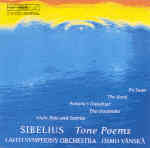A slightly mixed bag here. Osmo Vänskä and his players excel at presenting Sibelius’ gentler (and sometimes darker) side. This allows them to turn in wonderfully poetic and atmospheric performances of The Dryad and its accompanying Dance-Intermezzo, along with a truly evocative The Bard and a magnificently impressionistic account of The Oceanides (finely detailed with impressively sculpted bass lines). Vänskä’s sensitivity to the subtle nuances of Sibelius’ orchestration also ensures that the first half of Night Ride and Sunrise is aesthetically, rather than exasperatingly, monotonous, while the dawn sequence sounds aptly fresh and serene.
Problems creep in with the two greatest works: En Saga and Pohjola’s Daughter. The latter proceeds well until the recapitulation where Vänskä uncharacteristically buries the melody, which is tossed between the upper winds and cornets, beneath the rapid string figurations. The fault really is the composer’s, but it’s the conductor’s job to rebalance the orchestra here for maximum clarity of texture. En Saga has lovely quiet moments but lacks the power and rough edge necessary to produce what ought to be a primal, overwhelming impact. The opening sections, leading to the initial allegro, generate little cumulative energy, and the big climax (despite good presence from the bass drum) doesn’t pack quite the wallop that Karajan, Salonen, or Järvi (also on BIS) do.
The recording needs a high playback level, but it captures the sound of the orchestra very truthfully, with a wide dynamic range and finely judged perspectives. Certainly, it clearly demonstrates that what faults there are stem directly from Vänskä’s way with these works, yet listeners collecting his series of Sibelius recordings will certainly enjoy much of the music-making here. In a sense, this is one of those recordings that frustrates because so much of it really is terrific, and you know that all of it quite easily could have been equally great. On the other hand, I can’t think of another Sibelius tone poem collection that offers a better planned or more interesting selection of pieces. A tough call, then, but I’m still inclined to recommend it because the playing is unfailingly beautiful and idiomatic, even if you can find more excitement in En Saga and a better balanced Pohjola’s Daughter elsewhere.
































